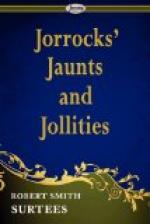On hearing this, a gentleman off with his glove and began collecting, or capping, prior to turning out—it being the rule of the hunt to make sure of the money before starting, for fear of accidents. “Half a crown, if you please, sir.” “Now I’ll take your half a crown.” “Mr. Jorrocks, shall I trouble you for half a crown?” “Oh, surely,” said Jorrocks, pulling out a handful of great five-shilling pieces; “here’s for this gentleman and myself,” handing one of them over, “and I shan’t even ask you for discount for ready money.” The capping went round, and a goodly sum was collected. Meanwhile the deer-cart was drawn to the far side of a thick fence, and the door being opened, a lubberly-looking animal, as big as a donkey, blobbed out, and began feeding very composedly. “That won’t do,” said Jonathan Griffin, eyeing him—“ride on, Tom, and whip him away.” Off went the whip, followed by a score of sportsmen whose shouts, aided by the cracking of their whips, would have frightened the devil himself; and these worthies, knowing the hounds would catch them up in due time, resolved themselves into a hunt for the present, and pursued the animal themselves. Ten minutes having expired and the hounds seeming likely to break away, Jonathan thought it advisable to let them have their wicked will, and accordingly they rushed off in full cry to the spot where the deer had been uncarted. Of course, there was no trouble in casting for the scent; indeed they were very honest, and did not pretend to any mystery; the hounds knew within an inch where it would be, and the start was pretty much like that for a hunter’s plate in four-mile heats. A few dashing blades rode before the hounds at starting, but otherwise the field was tolerably quiet, and was considerably diminished after the three first leaps. The scent improved, as did the pace, and presently they got into a lane along which they rattled for five miles as hard as ever they could lay legs to the ground, throwing the mud into each other’s faces, until each man looked as if he was roughcast. A Kentish wagon, drawn by six oxen, taking up the whole of the lane, had obliged the dear animal to take to the fields again, where, at the first fence, most of our high-mettled racers stood still. In truth, it was rather a nasty place, a yawning ditch, with a mud bank and a rotten landing. “Now, who’s for it? Go it, Jorrocks, you’re a fox-hunter,” said one, who, erecting himself in his stirrups, was ogling the opposite side. “I don’t like it,” said Jorrocks; “is never a gate near?” “Oh yes, at the bottom of the field,” and away they all tore for it. The hounds now had got out of sight, but were heard running in cover at the bottom of the turnip-field into which they had just passed, and also the clattering of horses’ hoofs on the highway. The hounds came out several times on to the road, evidently carrying the scent, but as often threw up and returned into the cover. The huntsman was puzzled at last; and quite convinced




